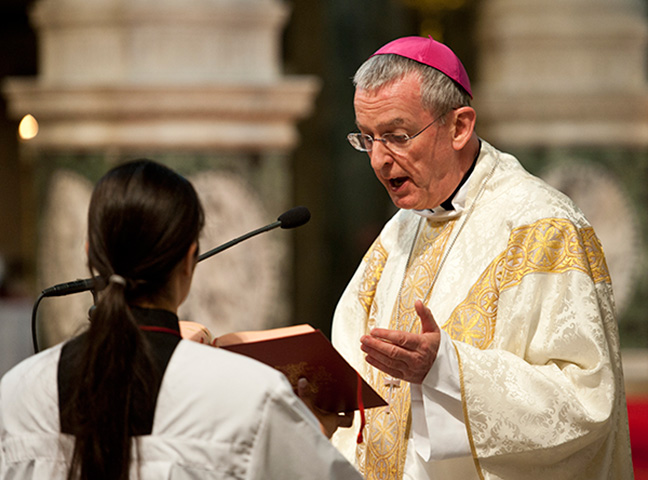
The following article was first published in The Catholic Universe, Friday 27 April, in it Bishop Declan Lang calls on sports fans to take a stand against the human rights abuses that often accompany international tournaments.
Already excitement is building ahead of a summer filled with major sporting events. In just under a month the biggest ever European football championship gets underway: fans from twenty-four countries, including for the first time Wales and Northern Ireland, will arrive in France while millions more gather to watch in pubs, living rooms and public squares across the continent. Shortly afterwards over ten thousand athletes will descend on Rio for the first Olympic games to be held on South American soil, and they’ll be closely followed an unprecedented number of Paralympians.
These events are cause for celebration: they bring people from different backgrounds together, showcase human endeavour, and inspire pride in communities. However from a human rights perspective it is also important to be conscious of the serious issues that often surround international sports tournaments.
In Rio work on venues and infrastructure has been beset by a succession of strikes over the harsh conditions that many labourers face. Subcontractors have been accused of withholding pay, failing to provide proper safety apparatus, and forcing workers to live in squalid conditions or even sleep in the open air. A rush to finish building in the final weeks ahead of Brazil’s 2014 World Cup was blamed for several deaths on construction sites, and many of those concerned with the rights of workers fear that the same may happen this summer.
Last year a Brazilian public prosecutor summed up the horrendous living conditions on one site by describing how “there were cockroaches, rats and sewage in the residences – many slept outside given all the filth” before adding “there are elements here characterizing working conditions analogous to slavery.”
Looking to Qatar which will host the World Cup in 2022, the situation is even worse. The rapid construction of stadiums, roads and hotels has seen hundreds of thousands of migrant workers from Nepal, India and Bangladesh working non-stop in blistering heat and dangerous settings, while earning barely enough to cover their most basic living costs. Several companies running construction sites have confiscated passports and refused to sign exit visas, effectively trapping people in these appalling circumstances.
In such situations workers are being treated as mere commodities, rather than human beings with inherent rights and dignity. Fans enjoying the tournaments, whether travelling to the host nations or watching from abroad have a responsibility not to stand idly by. Growing public criticism of abuses in Qatar has already forced FIFA to establish a new panel on better working conditions and promise to integrate labour rights as a specific aspect of the bidding process for subsequent World Cups. Sport relies on its fans and we can all help hold tournament organisers to account if workers’ rights continue to be violated.
Equally we should be mindful of wider human rights concerns in countries where major tournaments are held. The 2022 Winter Olympics are set to take place in Beijing, a move that has stirred painful memories of the crackdown on civil society and media that preceded the city’s summer games in 2008. The International Olympic Committee must ensure that commitments on human rights are honoured this time around, and sports enthusiasts have a role to play by speaking out if this does not happen.
Of course sports tournaments can also actively advance human rights and dignity. In Rio history will be made, when for the first time a team of refugees competes under the Olympic flag. Their place on the world stage will send a message of hope and showcase the endless potential of people who have been forced to flee their homes. Similarly in building on the success of London 2012, the largest ever Paralympic Games will continue to change perceptions of disability across the world. UK broadcasters have committed to five hundred hours of coverage, providing new levels of exposure to the inspiring triumphs of Paralympians.
So this summer and beyond let’s always bear in mind the bigger picture, never stand for exploitation or abuse in the delivery of these tournaments, and always champion the very best that sport has to offer.
By Bishop Declan Lang, Chair of the Catholic Bishops’ Conference Department for International Affairs.